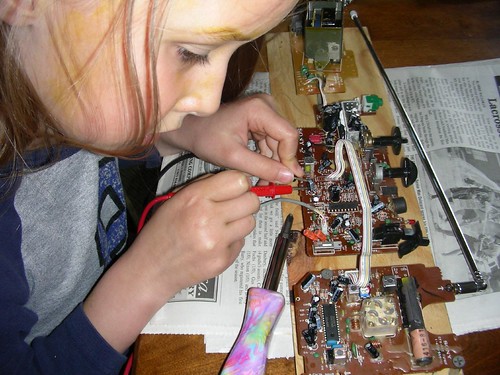When trash talks to you: The educational value of junk

When trash talks to you:
The educational value of junk
Intro:
As a teacher, tinkerer and curious person, I have learned a lot from junk. The discarded things and devices I have learned from have helped me to teach and learn about electronics, product design, mechanical devices and many other interesting ideas. Like many people picking through the discards of others, I have a few rules on what I will and will not gather. It should be useful when I pick it up, or fairly easy to make useful. I don't like dirty, moldy or otherwise noxious stuff. Obviously, if you are in relationship with others, those people may or may not be thrilled about a taste for trash. Spouses and neighbors, even city officials or neighborhood associations may have some opinions on what you can and cannot accumulate. Somehow, everybody has to be kept happy.
The value of emotionally unattached junk.
If somebody tossed it, you can do whatever you want to it. If you brick a device that came out of the trash, nobody will cry that they paid $400 for it five years ago. This is the most powerful concept of learning from trash. When I started working on a dumpscore computer, trying to turn it into a server for my classroom website, I realized that I could screw it up royally and nobody would be mad at me. That realization released me to be able to experiment without the fear of failure. It was trash. If I ruined it, I could put it back in the computer pile at the dump and nobody would know the difference. I made the computer into a server and used it effectively for years until I found another way of hosting websites.
What can you learn?
Electronics, mechanisms, product design, how things work, the history of technology, innovation, environmentalism,
How can trash talk?
Use your senses:
eyes - How does it look, does it have parts that are useful? What is written on it? What is the design of it?
ears - When you start it, use it, run it, does it make noises? Where are the noises from? When you pick it up, are there loose parts inside?
touch - What does it feel like, is it heavy, smooth? Can you feel the craftsmanship?
smell - Mostly, I give it a sniff test to see if it is musty. This is especially useful for books and computer that were used in basements.
taste - You probably shouldn't taste it, but some people don't have a problem with carefully found trash food.
How can you use the junk?
use it as it is
fix it
take it apart
make something new
take parts from one to fix another
take systems from one thing and add it to another thing
What do do when you are done with it
Take it back to where it came from.
Use it.
Give it away.
Sell it.
Take pictures of it.
Get rid of it.
Use it for parts.
Try to get rid of it.
Eventually, you probably ought to get rid of it.
Where can you get trashed?
The trash can in the house/school/office/etc.
Swap pile at the town dump
Dumpster
Loading dock
Somebody's junk heap/pile/room/etc. But always get permission first, because they may have something in mind.
Yard sale
Flea market
Photos to illustrate the ideas
Here are a few pictures that might go along with it, though I have many more. I have been doing this for years, and have a habit of often photographing as I go.
http://flickr.com/search/?q=
Here is a set of a project that I did a few years ago. I still have the radio, and may add to the project. http://flickr.com/photos/
It was fun to take the old radio apart, see what all the components did, how they were connected to the circuits of the other components and imagine how they could be reorganized into another device. I attached them to a scrap piece of plywood, and intended to add an mp3 player input where the cassette head was, and an FM transmitter to the output so that it could be used to transmit the input to other radios in the house.
Resources to help with the ideas
Duxbury, the town I live in, has an active picking pile at the dump. It is actually called the Duxbury Mall. I have been using it as a project supply resource for years. Many of my students use the dump for a lot of the points of this outlined topic. I can tap into the experiences those people ranging from kids to college students to adults. Many of the people who graduate from my program at Duxbury High School learned a lot of what they know using these techniques and are now studying or working in the engineering field. I know many other people in other places who share this mindset.
If you have projects that came from trash, let me know. What did you learn from the trash? What did you make? Where did you get it? How do you dispose of the tailings of your trashy life?
Labels: duxburymall, duxburytransferstation, joy of learning, learning from trash, learningfromtrash, transferstation
